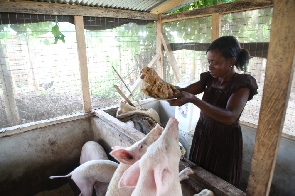 Doris Assampong says meat has market in all seasons
Doris Assampong says meat has market in all seasons
Rainforest Alliance has trained some selected farmers on alternative livelihoods like pig farming, bee keeping, cabbage farming, snail farming and others as part of their activities on the LEAN project in the high forest ecological zone of Ghana. Madam Doris Assampong, a cocoa farmer and a beneficiary in Sefwi Wiawso, Datano where Rainforest Alliance is implementing the project titled ‘The Landscapes and Environmental Agility across the Nation’ (LEAN) Project in an interview lauded the efforts to improve the livelihoods of people in the Western North. LEAN is a four year project funded by the European Union that aims to conserve biodiversity, increase climate resilience and reduce emissions from land use changes in the savannah, high forest and transitions zones of Ghana while helping local farmers improve their livelihood. According to Madam Doris who chose pig farming, she said ‘The reason why I picked pig farming is that cabbage has its season, snail has its season so is honey, but meat doesn’t deal with seasons, and there’s no way you wouldn’t get anyone to buy. Another reason is that, they also wanted everyone to live a comfortable life so just in case you can’t depend on your cocoa farm, you know there’s something else to fall on’. She however commented on some of the challenges that she was facing as a pig farmer. ‘Feeding and water is a challenge, because the source of water I rely on is far from me so I buy water for the pigs and their feed is expensive.’ Madam Doris entreated other entities to come to their aid just as Rainforest Alliance Ghana has. The LEAN project which was launched on May 11, 2021, at the national level and subsequently launched at the three targeted landscapes is implemented on the ground by a consortium of four local and international NGOs with expertise in these challenging fields: The Rainforest Alliance, World Vision Ghana, Tropenbos Ghana, and EcoCare Ghana
Rainforest Alliance has trained some selected farmers on alternative livelihoods like pig farming, bee keeping, cabbage farming, snail farming and others as part of their activities on the LEAN project in the high forest ecological zone of Ghana. Madam Doris Assampong, a cocoa farmer and a beneficiary in Sefwi Wiawso, Datano where Rainforest Alliance is implementing the project titled ‘The Landscapes and Environmental Agility across the Nation’ (LEAN) Project in an interview lauded the efforts to improve the livelihoods of people in the Western North. LEAN is a four year project funded by the European Union that aims to conserve biodiversity, increase climate resilience and reduce emissions from land use changes in the savannah, high forest and transitions zones of Ghana while helping local farmers improve their livelihood. According to Madam Doris who chose pig farming, she said ‘The reason why I picked pig farming is that cabbage has its season, snail has its season so is honey, but meat doesn’t deal with seasons, and there’s no way you wouldn’t get anyone to buy. Another reason is that, they also wanted everyone to live a comfortable life so just in case you can’t depend on your cocoa farm, you know there’s something else to fall on’. She however commented on some of the challenges that she was facing as a pig farmer. ‘Feeding and water is a challenge, because the source of water I rely on is far from me so I buy water for the pigs and their feed is expensive.’ Madam Doris entreated other entities to come to their aid just as Rainforest Alliance Ghana has. The LEAN project which was launched on May 11, 2021, at the national level and subsequently launched at the three targeted landscapes is implemented on the ground by a consortium of four local and international NGOs with expertise in these challenging fields: The Rainforest Alliance, World Vision Ghana, Tropenbos Ghana, and EcoCare Ghana